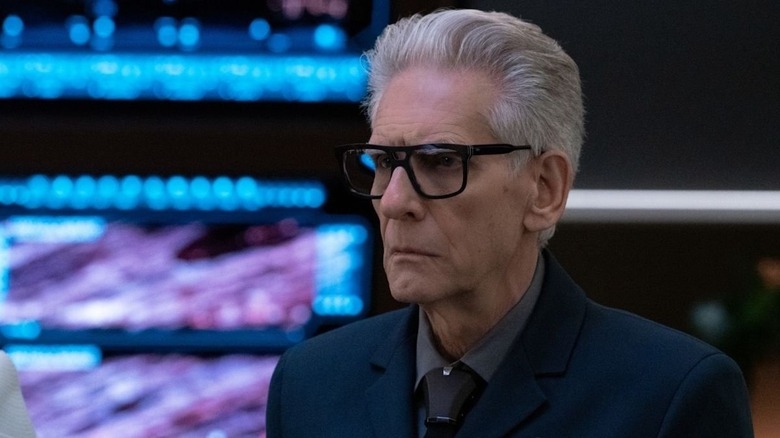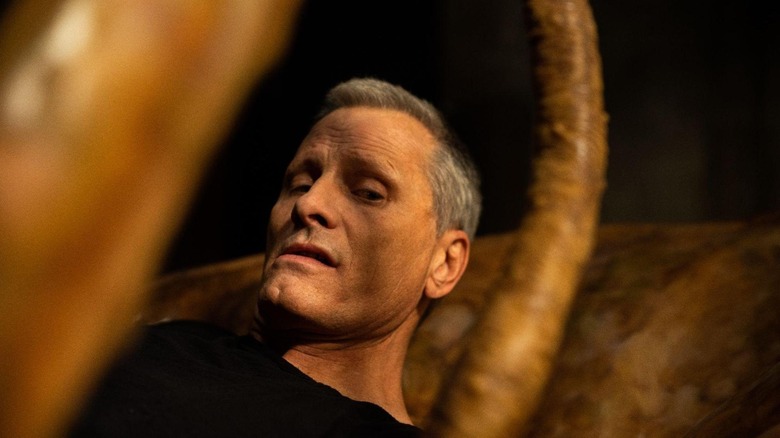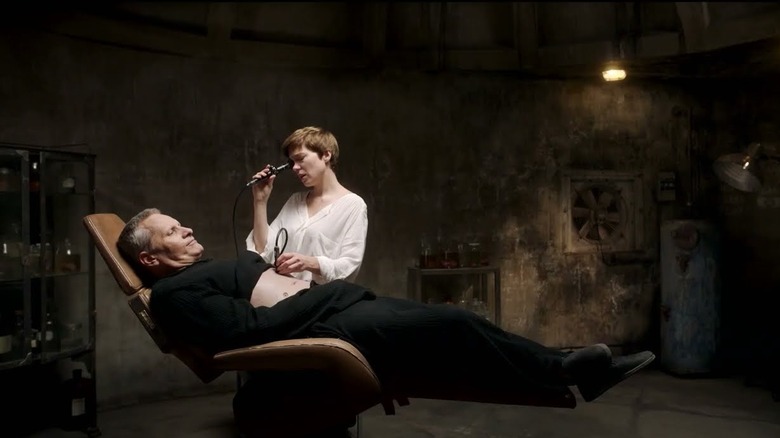How Taking TV Acting Gigs Prepared David Cronenberg For Crimes Of The Future
David Cronenberg is anything but conventional, so when an unprecedented global pandemic struck, he knew it would take an inventive approach to overcome these new obstacles. COVID-19 changed the way we approach everything, from school to the legal system to entertainment. Every industry had its own new set of protocols, and film and TV productions were no exception. Cronenberg wanted to know how difficult it would be to make a film in the shadow of the pandemic, so he decided to do his own research in the field.
"Crimes of the Future" was shot in August of 2021, Variety reported. About a year and a half into the pandemic, filmmaking was back in action, but protocols were still very strict. Cronenberg knew it would be difficult to navigate this brand-new landscape of production, but this project was a long time in the making. It actually got greenlit by Serendipity Point Films back in 2003 but struggled to get off the ground for decades.
Nothing was going to stand in Cronenberg's way of making "Crimes of the Future," not even a pandemic. Still, he had to make sure he would be able to make the film while safely complying with new public health laws. Prior to launching into production, the director decided to take matters into his own hands. He figured that the best way to learn how sets were functioning in the new world was to work on one of them — so that's exactly what he did.
It taught him what to expect in a post-COVID landscape
Before Cronenberg shot "Crimes of the Future" in 2021, he wanted to know what type of COVID restrictions and regulations he would be working with. To research his new role as a director, he took on some other roles in television acting. The Canadian filmmaker joined the cast of "Star Trek: Discovery" as the recurring character Kovich, a doctor and teacher at Starfleet Academy. He also took a role in the fourth season of the Shudder series "Slasher" as Spencer Galloway.
"I wanted to see if it was possible to make a movie with those protocols," Cronenberg explained to IndieWire:
"How awkward does it make things, how much more expensive does it make things, does it affect your acting, your directing, your acting? I saw that it was perfectly possible to do. It was more expensive, it was more awkward, but it was very doable and you got used to it. You got used to wearing the mask."
These acting gigs left Cronenberg extra prepared to face the challenges that the virus presented during production. Luckily, he handled everything efficiently and effectively. "[A]mong our crew of 150, nobody got COVID," the director claimed, "so it worked."
Don't expect a COVID film out of Cronenberg, though
Cronenberg ran a COVID-safe set, but it's natural to wonder whether such a powerful virus sparked inspiration for a director that specializes in the corruption of the human body. In fact, some other filmmakers hope that Cronenberg will tackle the subject in the future.
"I'm looking forward to the first COVID exploitation movie," transgressive filmmaker John Waters admitted to Indiewire. "COVID-sploition! The virus comes back or somebody purposely spreads it, David Cronenberg should do it." Cronenberg himself isn't so sure that the virus would make for a rich metaphor.
"I don't find inspiration in it at all, but I do find it fascinating," the "Crimes of the Future" director told Pique News Magazine. "In my 77 years, I haven't experienced anything quite like it." It's possible that Cronenberg just thought that it was too soon to mine a major global tragedy for film ideas, but only time will tell. Cronenberg likes to invent his own fictional dystopias, not recreate the one we already live in.


